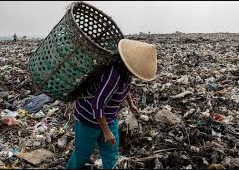(单词翻译:单击)
中英文本
The "circularity gap," as de Wit and his colleagues dubbed it when they presented their report at the World Economic Forum in Davos in 2018, is relatively new in human history. It dates to our industrial use of fossil fuels in the 18th century. Until then, most of what humans did was done with muscle power, whether human or animal. Growing things, making things, shipping things took hard labor, which made them valuable. Our limited physical energy also restricted how big a dent we could put in the planet. It kept most of us very poor, however.
德威特及同事在2018年达沃斯世界经济论坛上作报告时,将这一现状称为“闭环差距”,它在人类历史中属于较新的现象,始于18世纪开始的化石燃料工业应用。在那之前,大部分生产都依靠人力或畜力。种植、生产、运输都需要付出艰苦的劳动,令它们价值更高。有限的体力约束了我们对地球造成的冲击。但这也让大多数人非常贫困。

Cheap fossil energy, concentrated by geologic time and pressure in seams of coal or pools of oil, changed all that. It made it easier to extract raw materials anywhere, ship them to factories, and send the merchandise everywhere. Fossil fuels exploded our possibilities -- and the process keeps intensifying. In the past half century, while the world's population has more than doubled, the amount of material flowing through the economy has more than tripled.
经过地质时间和压力的凝缩、富集于煤层和油田中的廉价化石能源改变了这一切:从世界各地提取原材料、运到工厂、输出产品都变得更加容易。化石燃料使人类事业的可能性暴增,搜刮资源的过程也愈演愈烈。在过去半个世纪中,全世界人口增长了一倍多,而在经济系统中流通的物资量增长了两倍有余。
"Now we're reaching the limits," de Wit said.
“现在我们即将到达极限,”德威特说。
重点讲解
1.relatively new 比较新的
It's a relatively new acknowledgment in the scientific community.
这是科研领域相对比较新的发现。
2.reach the limit 达到极限
What will happen when we reach the limits of the available resources?
当到达可用资源的极限时,我们会怎么样呢?


